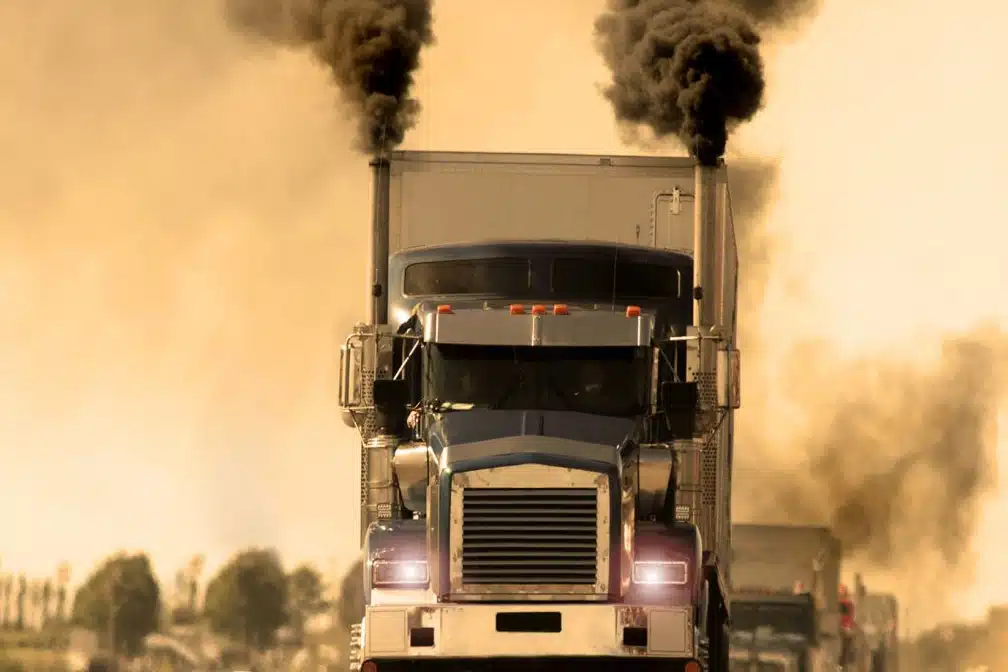Truck Driver News – U.S. Departments of Transportation Below is a list of the U.S Department of Transportation (DOT) or equivalent agencies for each state in the
Continue Reading
May 19, 2024 4:52 pm

In recent news, a coalition of 21 states has filed a lawsuit challenging the Biden administration’s emission performance measures for state Departments of Transportation (DOTs) and metropolitan planning organizations. This legal battle has significant implications for the trucking industry, as it addresses the regulation of greenhouse gas emissions and its potential impact on truck drivers.
The lawsuit, filed against the Federal Highway Administration (FHWA), FHWA Administrator Shailen Bhatt, the U.S. Department of Transportation (DOT), Transportation Secretary Pete Buttigieg, and President Joe Biden, questions the authority of federal agencies to issue these emission performance measures.
The FHWA’s new rule introduces a greenhouse gas performance measure to evaluate the performance of the National Highway System, which encompasses vital routes for truck drivers. State DOTs and metropolitan planning organizations are now required to establish targets for reducing CO2 emissions generated by vehicles. These targets must be reported to FHWA by February 1 of each four-year period.
One crucial aspect of the FHWA’s rule is that it allows state DOTs and metropolitan planning organizations flexibility in setting their emission reduction targets. This flexibility allows them to tailor targets according to their specific communities and climate change priorities while still aiming to reduce emissions over time. FHWA will assess the progress of states toward achieving these targets.
However, the states involved in the lawsuit argue that FHWA and other federal agencies do not have the authority to regulate greenhouse gas emissions. They reference a similar rule issued by FHWA in January 2017, which required states to establish emission reduction targets. During the Trump administration, this rule was repealed, arguing that there was no legal basis for FHWA or the U.S. DOT to mandate emission reduction.
Kentucky Attorney General Daniel Cameron expressed his concern, stating, “President Biden is unconstitutionally ramming his radical climate agenda through administrative agencies that lack Congressional authority to implement such actions. We will not stand by while this administration attempts to circumvent the legislative process.”
The impact of these emission performance measures on the trucking industry is of significant concern. The lawsuit also highlights that these measures may disproportionately affect states with more rural areas, which often have higher average annual miles per driver. Rural residents tend to drive 10 miles more per day than their urban counterparts, making it essential to address any potential economic and operational challenges faced by truck drivers.
As the FHWA’s emission performance measures are set to take effect on January 8, 2024, it is crucial for truck drivers and the trucking industry to stay informed about the developments in this legal battle. The outcome of this lawsuit will likely shape the regulations affecting the trucking industry’s efforts to reduce greenhouse gas emissions in the coming years.
The trucking industry plays a vital role in our economy by ensuring the timely delivery of goods and services across the country. It is essential to strike a balance between environmental goals and the practical realities of trucking operations. As the legal proceedings continue, truck drivers, industry stakeholders, and state authorities will closely monitor the news for updates on this important issue.
In conclusion, the lawsuit challenging the FHWA’s emission performance measures brings into question the authority of federal agencies to regulate greenhouse gas emissions in the trucking industry. Truck drivers and the trucking industry should remain attentive to developments in this case, as the outcome will likely have a significant impact on their operations and compliance with emissions regulations. Balancing environmental concerns with the practical needs of the trucking industry is a challenge that will continue to shape the future of transportation.
Truck Driver News – U.S. Departments of Transportation Below is a list of the U.S Department of Transportation (DOT) or equivalent agencies for each state in the
Continue ReadingThe 2024 CVSA International Roadcheck is scheduled for May 14-16. Over 72 hours, inspectors across the US will conduct nearly 15 vehicle inspections per minute.
Continue ReadingU.S. DOL Issued a Final Rule on Independent Contractor Classification January 10th. The Rule Aims to Reduce Unfair Practices but Could Threaten Owner-Operators.
Continue ReadingConnell High School in Connell, Washington, has formally petitioned the FMCSA to allow students under 18 to obtain commercial learner's
Continue ReadingIn an effort to increase efficiency and sustainability in Trucking, Phillips Industries has launched their new, advanced, stick-on solar panels
Continue ReadingThe U.S. government is increasing scrutiny on Chinese companies that are potentially dodging tariffs by manufacturing Chinese EVs (electric vehicles)
Continue ReadingIn a legal battle that could reshape the trucking industry, 24 Republican states join to bring a lawsuit against the
Continue ReadingAutomated License Plate Readers are a major advance in law enforcement technology but they raise significant privacy and oversight challenges.
Continue ReadingOOIDA • ATA • DOT • NASTC • WOMEN IN TRUCKING • NPTC • DRIVER RESOURCES • TDN STAFF • ARCHIVES • SITEMAP